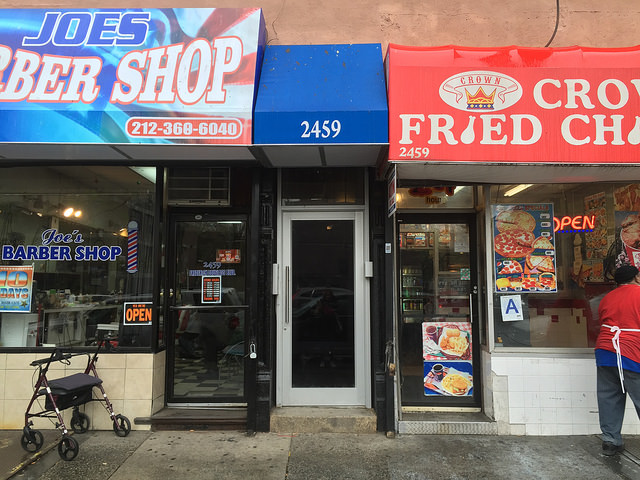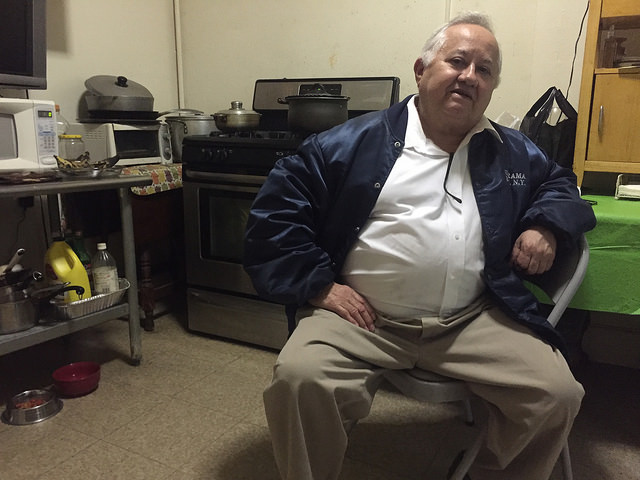
by Amina Srna
With the west side of Harlem rapidly gentrifying, big name realtors are buying up apartment buildings while landlords of prior low-income housing units, like Zamira Abdelhady’s, struggle just to keep up with repairs.
Utilities like electricity, heat in cold winter months, and safe drinking water are the pillars of tenant’s rights, and Abdelhady and her neighbors feel like they’ve got a strong case against the landlord.
So, what happens to a building when a landlord can’t make repairs?
Flor Sanchez and the vacant bus depot
The easternmost block of 126th is home to New York City’s oldest bus depot. Flor Sanchez,80, moved across the street as a child with his family from Puerto Rico in the 1950s. Back then, it was a bustling trolley yard. As an adult, Sanchez capitalized from the business of the MTA employees, building a restaurant and a club on the small dead-end street.
Today, aside from the congested exit ramp of the Robert F. Kennedy Bridge, the area remains largely deserted. The site of the bus depot will be turned over to the city, which has plans to develop residential opportunities, the value of the site having doubled in price since 2012.
As the city determines how to profit off of the vacant lot, Sanchez waits for NYC Housing Preservation and Development (HPD) to approve an estimate for boiler repairs. Once the budget is approved, the contractor has asked to deal directly with the city.
“I get disgusted calling HPD,” he said. “Imagine if the temperature is real cold. By the time HPD gets ahold of them, we’d all be freezing ourselves.”
This is one of the many responsibilities Sanchez has as the president of his building’s tenant association. When his landlord passed away in 1986, this area was of no interest to real estate developers, so the city turned over the building to the tenants under what is called the Tenant Interim Lease Project (TIL).

Flor Sanchez, 80, sits in the kitchen of the apartment he has shared with his mother since the 1950s. Photo by Amina Srna
Those who stayed in the foreclosed apartment buildings could form associations that lease directly from the city. TIL would provide educational services for tenant associations in building management, maintenance and financial recordkeeping. Once the associations proved to be stable, the tenants could buy their apartments outright for $250.
“The essence of TIL is that they’re supposed to get trained, and then they’re supposed to engage in self-management and then eventually become a coop,” says Valerio Orselli, the founder of the Cooper Square Mutual Housing Association. “The training was available, but people were not up to it. They were poor, in some cases desperately poor. It was a pig in a poke. “
Orselli says that when people are struggling with wages being depressed, in addition to having to worry about the day-to-day management problems of their buildings, of course some people can do it, but it’s a burden. Especially for Sanchez, who will be turning 80 this May.
“There’s a lot of times that I do work on the boiler,” Sanchez said. “I’m always with the boiler. I don’t want nobody to freeze here.”
Few buildings owned by the City ever make it to the stages of complete renovation. In fact, the results of the TIL program inadvertently the second largest public housing system in the country, including 2,422 residential units, 897 of which have remained vacant.
“There’s valuable housing stock that could have been really developed as permanently affordable housing,” said Orselli. “During the Giuliani administration there was policy trying to dispose them as much as possible, wholesale. Regardless of whether or not the residents could create a viable cooperative. They encouraged speculation.”
When city officials asked Sanchez to relocate his tenants to another building further up in Harlem so that they could do repairs, he refused.
“Since the city took over, they did one repair in the building to put up bathrooms real nice and big,” said Sanchez. “Meanwhile they didn’t give us no bathroom and no showers. For six months.”
At the end of the repairs, the bathrooms were smaller than when they had begun renovation. The elderly tenants of the building have to side step their way in between the toilet and the bathtub. Recently, Sanchez’s elderly mother fell trying to come out of the bathroom, breaking her hip.
Despite the condition of the building, this is the home that Sanchez and his extended family have known for over half a century. With the looming threat of speculation looming from as close as across the street, he wants to stay here as long as he can.
“If I would have let HPD convince me, and I would have had to convince the few tenants we have here,” said Sanchez. “They would have taken our building and sold it to the developers. They would have pushed us out.”
Take a look inside Flor Sanchez’s apartment.
(View in Virtual Reality by using the Chrome Browser)